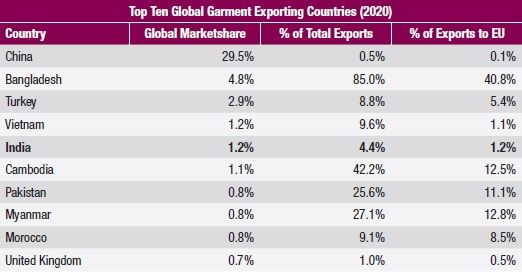As citizens start seeing global warming as an existential threat, governments are being pushed to take action, or at least seem to be taking action. For the garment industry, the European Union has made the first move by announcing that all clothing sold in its territory must meet sustainability standards.
“Everybody talks about the weather, but nobody does anything about it.” This was a joke, written by Mark Twain, about 150 years ago and remained a joke until late March 2022, when the EU finally decided it was time to do something about the weather aka global warming.
For over 500 years, international trade was perhaps the primary motivating force for foreign policy of the governments. Foreign trade was a thing in itself. There were those who argued for free trade while others favoured protection for local industry. However, whatever the pros and cons of trade, no one considered the effects of trade on the world at large. As a result, foreign trade brought serious problems. It brought mercantilism and colonialism. On the other hand, Columbus’ rediscovery of the new world was the unforeseen result of a failed effort to find a new trade route to the Indies.
Foreign trade was the universal justification for virtually everything.
• If you want cheap sugar, you must accept slavery
• If you want tea, you must accept opium
• If you want fast fashion. You must accept global warming
The free-trade mantra remained unquestioned until the advent of the global warming crisis. Global warming is different.
Global warming is a global problem that requires a local solution.
For years, serious people both in the government and in the industry pleaded for countries and corporations to take the necessary steps to reduce global warming, but to no avail.
Table 1

World leaders would meet periodically to find solutions to the global-warming crisis. At these meetings, government leaders and senior executives from major corporations guaranteed to reduce pollution and greenhouse gases over specified periods of time. Unfortunately, after each event, the world-leaders and senior corporate managers would return to their home offices and government departments where they turned their promises over the relevant parties. Regrettably, those relevant parties were not executives, nor engineers nor chemists but rather experts in public relations because as everyone knew changing-the-weather was a joke.
The Beginning of Change
On May 26, 2021, a Hague District Court ruled that the Royal Dutch Shell, one of the world’s premier oil companies, has a duty to reduce emissions by 45 per cent by 2030. In response, Shell did not appeal but rather eventually presented the court with the detailed steps they would take to meet the court’s requirement, including a schedule of deliverables. This was a first step in the move towards greater sustainability.
On March 30 this year, the EU announced, “the begging days are over! This global problem will be solved locally!” Henceforth, all garments sold in the EU must meet standards of sustainability (specific standards to be announced). This will have serious impact on the EU garment exporting partners.
This will no longer be limited to specific factories but rather applied to entire export industries. If a garment is produced using electricity, water, or air which is seen to be polluting and unsustainable, that garment may be barred from sale in the EU.
This will require garment exporting countries to effect real change. However, the willingness to effect change by the governments of the exporting countries will be based on two factors: 1. How important is their garment exporting industry? and 2. What changes will they be called upon to make?
For the purposes of this article, we will use India as our example.
a.1.2% = India’s global garment marketshare
b.4.4% = Garments as a per cent of India’s total exports
c.1.2% = Garment exports to the EU as a per cent of total exports
From Table 1, we can see that as far as India is concerned, garments (4.4 per cent) are not a primary export product, and exports to the EU is 1.2 per cent, i.e., relatively of little importance to India’s foreign trade. The loss of garment exports to the EU would not be devastating to either the EU or India.
However, the problems arising from the EU’s new policy are quite serious. Where in the past, countries could speak of success (or failure) on a factory-by-factory basis, the measurement of sustainability will be made on a national basis, whereby imports of products will be limited based on national aggregates. Individual exporters will no longer be able to claim that they are not responsible.
Below is a short list of four major areas where the EU might well require change.
• Water consumption: Some years ago, the World Wildlife Fund (WWF) carried out an extensive study of India’s cotton farming industry. It concluded based on the then irrigation practices where 1900 litres of water was required to grow enough cotton to make a single T-shirt. The study suggested that the drip-method would notably reduce both water consumption and the of cost of electricity to run the irrigation pumps. The suggestion was never adapted because after taking the government subsidies into account, the cost of electricity to the farmer was $0. Furthermore, India’s cotton fibre exports have been declining from $4.5 billion in 2013 to $1.4 billion in 2020. Why bother to spend capital to effect change?
• Coal as a motive power: As of 2020, 71 per cent of India’s electricity was generated by coal, compared with China’s 61 per cent, US 19 per cent, and EU 10 per cent. This not only is a major cause of global warming but also gives India’s exports an unfair trade advantage.
• Air pollution PM2.5 (ug/m3): At 51.90, India ranks 3rd in the list, with Bangladesh (77.10) and Pakistan (59.00) ahead of it, compared with 9.04 of the US.
• Water pollution: The Ganges is the world’s most polluted river. Over 2,000,000,000 people rely on the river for their basic needs, such as drinking, and cooking.
Some will argue that this is unfair:
• Factories are not the perpetrators but rather the victims. They cannot control the source of electricity, nor the causes of air or water pollution.
• The United States and China produce far more greenhouse gases and therefore share greater responsibility for global warming.
There is no doubt that these critics are correct and indeed this whole process is demonstrably unfair.
These arguments while 100 per cent true are regrettably irrelevant. If the EU imposes restrictions on anybody, it will almost certainly not be China nor the US. These countries are too important. The EU will pick THE LOW-HANGING-FRUIT —India and its fellow Asian garment exporting countries. When push comes to shove in the world of international affairs, fairness counts for very little.
At the end of the day, everything depends on how far each side is prepared to go.
The EU is being pushed by its citizens who see global warming as an existential threat. Its member governments must be seen to be taking action. Major corporations in the West are being pushed by activist shareholder groups who even now are pressing for CEO remuneration to be at least partly tied to their actions to reduce global warming. Acting against Asian garment exporting countries would be seen as a step forward, at little or no cost to either government or business.
On the other side, India’s government must show its citizens that India will not bow to foreigners’ demands. With garments accounting for only 1.2 per cent of total exports, government may be willing to hang tough and take the loss.
Alternatively, the EU may take no action at all, leaving the Government of India with no need to react.









Comments